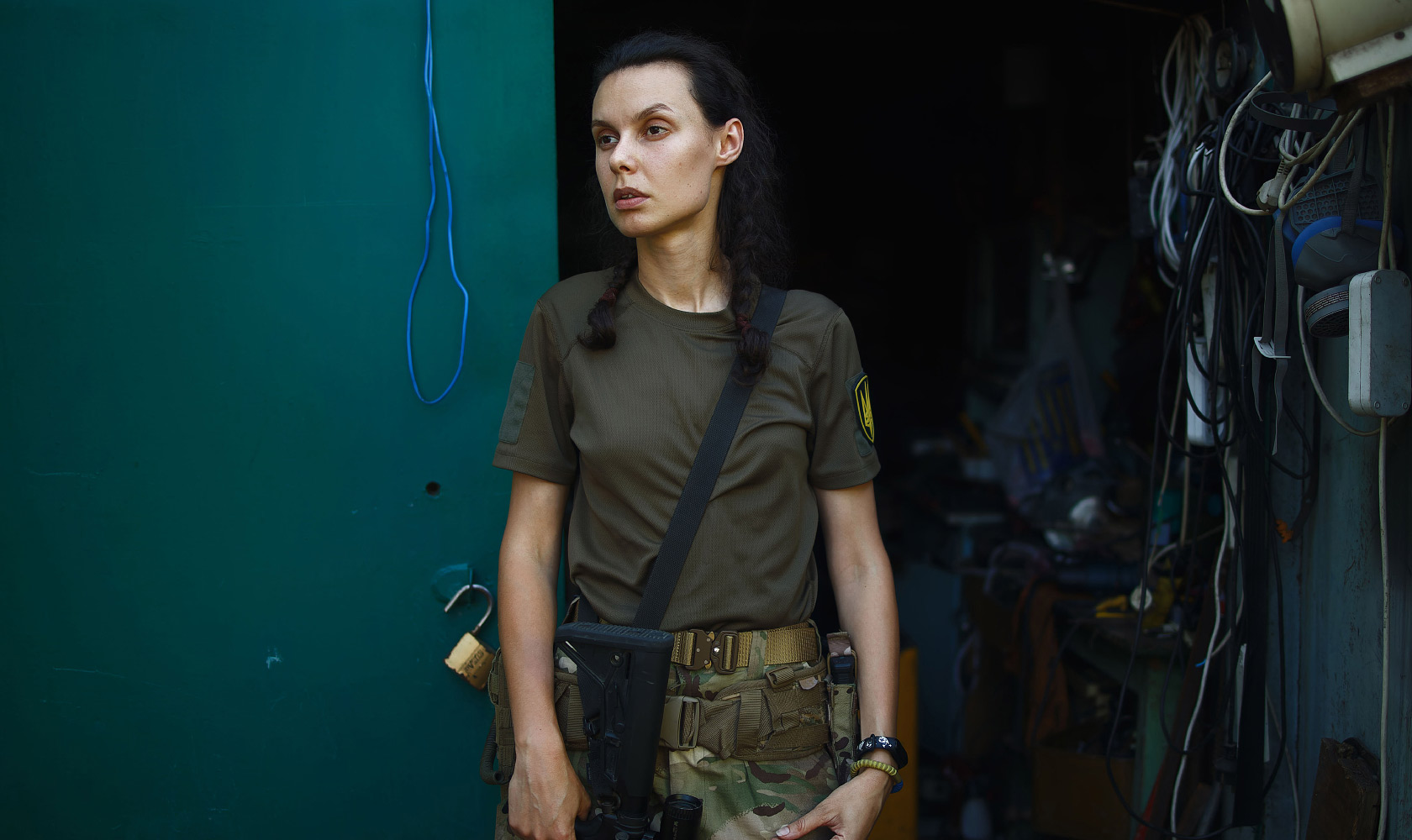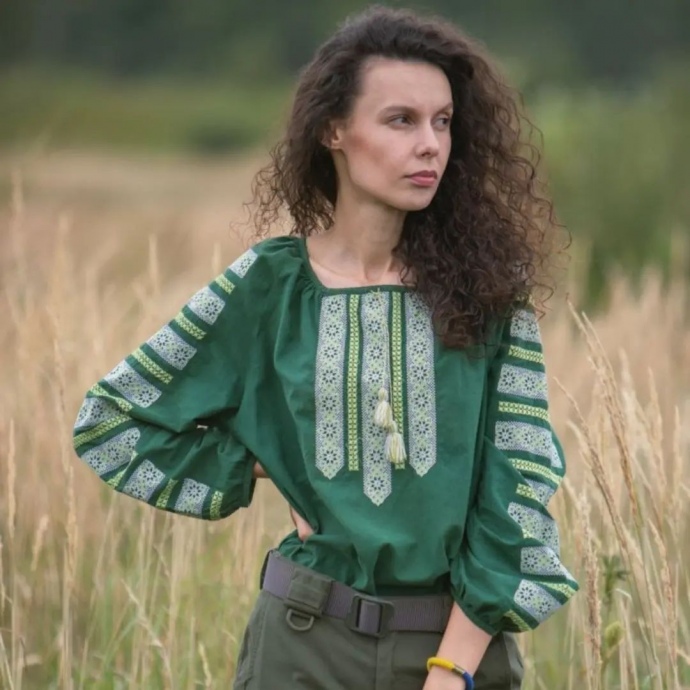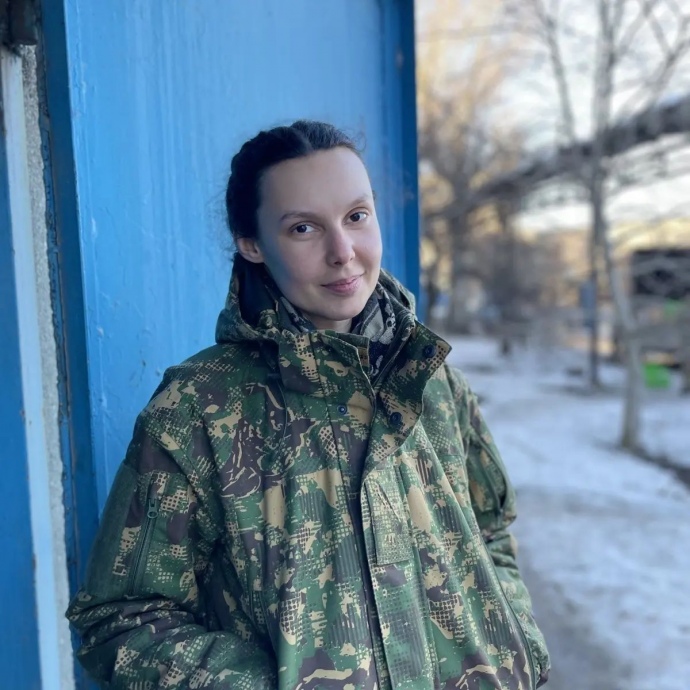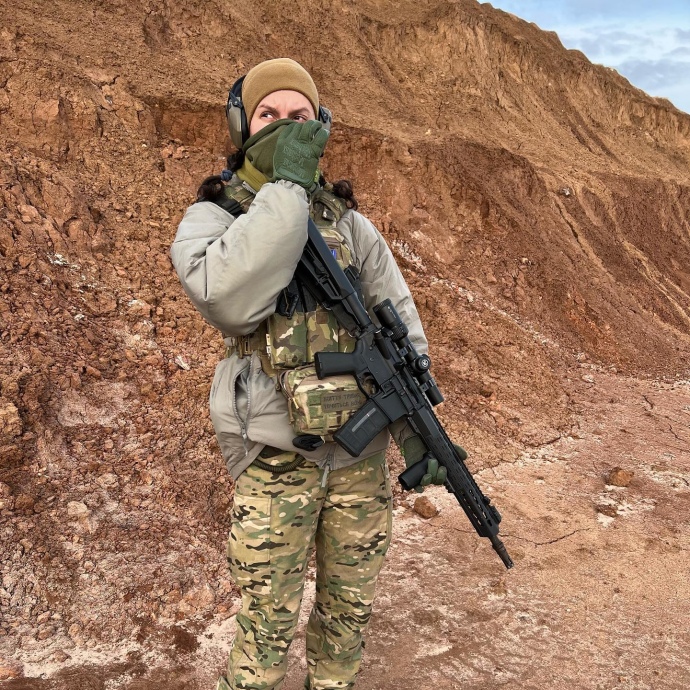From the defence of Rubizhne to the hell near Bakhmut. The story of guardswoman Khrystyna "Kudriava"

This war is made up not only of victories of the Ukrainian army, the liberation of large cities and entire oblasts, but also of gruelling defence operations.
The battle of Mariupol is the most famous of those battles. The defence of Rubizhne has so far commanded very little attention.
All of the key cities in eastern Ukraine – Mariupol, Rubizhne, Sievierodonetsk, Lysychansk and, more recently, Bakhmut – have been or are now the most hotly contested areas on the front. The Russian army is trying to raze these cities to the ground, sparing no soldiers or ammunition. The Ukrainian army is continuing to defend those cities wherever possible; troops retreat if there is a threat of encirclement.
The 4th Rapid Reaction Brigade of the National Guard of Ukraine, and in particular military unit No. 3018 (in the city of Hostomel), has defended some of those cities. The brigade is considered an elite unit of the National Guard of Ukraine and has been created in accordance with NATO standards.
In early December, Ukrainska Pravda met with Khrystyna "Kudriava" ("Curly-haired"), a guardswoman serving in the military unit No. 3018 [in the vicinity of Bakhmut – ed.], and decided to interview her about the defence of Luhansk and Donetsk oblasts.
In 2014, Khrystyna was told "You’re just a girl" and denied enlistment in the army. In 2022, however, after three years of serving in her hometown of Ivano-Frankivsk and the National Guard Academy in Kharkiv, she could no longer be dismissed.
Khrystyna is only 29 and is already a deputy commander of a mortar battery and holds the rank of senior lieutenant of the National Guard of Ukraine.
What follows is Khrystyna’s story in her own words.
"Careful what you wish for"
We spent most of 2021 at military training grounds and international military exercises. Canadian soldiers taught us how the NATO decision-making protocol works, and situational assessment practices; this really helped us in Lysychansk later on. I’m proud to say that our unit helped bring together all other units in the area.
Unfortunately, at the time we suffered huge losses, many of my comrades were injured, and our unit was being reinforced [with people from other units – ed.]. But we were still in charge of planning and information management.
We were constantly being prepared for the war, you know? We weren’t responsible for protecting public order or escorting prisoners [in contrast to other units in the National Guard – ed.]. We were guarding the Antonov airfield and preparing for combat. We were focusing on urban warfare and I was really fascinated by that.
When I was still an academy student, I realised that I wanted to join the National Guard’s combat division. It was my top priority. I was really upset when someone told me those positions were not available. Later on, however, they did appear! It’s true, I had to be a bit more assertive, to prove my mettle, but eventually I succeeded.

In early February 2022, I was assigned to a reconnaissance mission in Stanytsia Luhanska. On my way there I was kicking myself for going to the "cosy" ATO [Anti-Terrorist Operation zone, a term used to identify Ukrainian territory of Donetsk and Luhansk oblasts under the control of Russian military forces – ed.], where I will receive the status of a combatant even though the war there was essentially over. Meanwhile, my friends have been fighting in voluntary battalions since 2014!
When we arrived at Stanytsia Luhanska, however, we came under several Grad multiple rocket launcher attacks, and people were acting as though something unusual was underway. On 17 February, a kindergarten near Stanytsia was hit, that must have been the beginning of the full-scale invasion for me.
I kept asking people around me what was wrong and they told me that Grad attacks used to be rare; they were something that shocked people. Many of them, however, spent the previous month hiding in basements and dugouts from these attacks. By around 20 February, everyone knew that something grave was drawing closer.
Reserve units were deployed at the border and there were numerous helicopters in the sky; we were trying to reconnoitre the situation on the front. The Siverskyi Donets River flows near Stanytsia, by the way; it’s as though the river is chasing us now. [Smiles]
On the night of 23-24 February, I was listening to intercepted conversations. At one point I heard that the Russians were preparing for an artillery attack; they often engaged in "radio games" like that, but this time I felt uneasy. I woke a reconnaissance officer and told him, "Get up, they’re preparing artillery," but he just told me to leave him alone and let him sleep.
But I didn’t relent and woke everyone up. That’s how the full-scale invasion started for us.
On the morning of 24 February we set out to meet a Ukrainian convoy travelling from Lviv Oblast to Luhansk. We got into the car of one of our officers; it had a very low ground clearance and we had to drive through fields where even four-wheel drive vehicles got bogged down. When we passed through Shchastia, we saw that it was being shelled… That was the first time I thought that I should write to my mom, I was not sure I would come out of there alive.
Thank God, we got out, though our car did get bogged down right in front of the column we were there to meet. Shchastia, vegetable gardens, swamps – we made it through all of that, but got bogged down in front of the column. [Smiles]
That’s how the war started for us in Stanytsia.
We later suffered heavy losses near Trokhizbenka [a village near Shchastia – ed.]; our entire company was defeated there. The guys retreated through the forest, leaving their ammunition behind. A lot of them got back, but some were captured.
We were then deployed in Sievierodonetsk, then Rubizhne, then Sievierodonetsk again.
"Careful what you wish for, your wishes may come true" – this was definitely true in my case. After the full-scale invasion began, the guys would ask me, "So how’s the ‘cosy’ ATO going?" I no longer felt like I was taking part in historic events. I just felt the huge weight of responsibility.
Khrystyna’s Facebook post from 1 March: "The army is with you and is fighting for you."
"In Rubizhne, our choice was simple: either we withdraw or our bodies will remain there forever"
We entered Rubizhne in Luhansk Oblast in March. The city’s defence was all about urban warfare, which, as I said before, we spent all of 2021 learning about. Our comrades in the Armed Forces of Ukraine, who were trained for field combat, used to say that they felt safe if they knew someone from unit No. 3018 was in their vicinity on the front.
What happened in Rubizhne was difficult for us, but at least we knew what to expect.
Russian artillery was relentless there…In a day they would fire the same amount of ammunition we had for the week. There was no targeted fire, they were just obliterating different parts of the city, one after another. If they had an approximate target, the entire area around it would get wiped out, attacked with tank guns and various calibres of artillery.
Watching news from that area now, I see that nothing has been or is being restored: there is no water, no gas, nothing. It’s upsetting, but there were people waiting [for Russia – ed.] in both Rubizhne and Sievierodonetsk. During street combat and shoot-outs, civilians – including those with kids – would just walk past on the street. They didn’t hide, didn’t run for their lives, didn’t fall to the ground.
Khrystyna’s Facebook post from 19 March:
"One day I will tell you about cohesive, professional work, I’ll give you names and dates. I will tell you about the unimaginable amounts of cannon fodder sent to die on our front.
I will tell you about the work of our commanders, who inspire hope even when you feel like you are about to surrender the last line of defence. About artillery and about the guys I work with, each of whom is exactly where he ought to be (I’m sorry for my doubt when I was signing your contracts). About shouting on the radio after successful operations and the uncomfortable silence following injuries and losses.
For now, a deep inhale, a deep exhale, and back to work. Have faith in us."
Around April, the Russians breached one of our flanks and entered the city; street combat ensued. It was relentless. The 10 months of the war flew by for me, but in Rubizhne each day dragged on.
Besides us, the 79th and 81st [brigades – ed.] were deployed [in Rubizhne – ed.], and the 24th, I think, in Kreminna. When our unit started to "run out", they were the ones to maintain defence, though we remained the "brains" behind it.

The Russians had a significant advantage in people and artillery; with time, we were forced to withdraw. Our choice was simple: either we withdraw or our bodies will remain there forever. Our withdrawal really was extremely difficult.
Some people want to see Rubizhne reclaimed, returned under Ukraine’s control; others don’t want to think about it at all, because of the number of lives its defence has claimed. What do I want? I want to go back, but not as part of an infantry unit. [Smiles slightly]
When we were on the offensive, when we were reclaiming Lyman – that was about victory. Everyone was saying, euphoric, that that was also how we would reclaim Rubizhne. But when we were in Rubizhne itself, that was all about defence, and that’s far from rosy.
"A 10-metre tall concrete wall was supposed to be built in Lysychansk while we fought in Sievierodonetsk"
In late April to early May, we withdrew from Rubizhne and were immediately deployed to Sievierodonetsk. At first, we were defending the Azot plant [one of the largest chemical plants in Europe – ed.], then we were deployed to the settlements to the right of it: Metolkino and others.
I found Sievierodonetsk to be a bit easier because, first of all, we were no longer at the epicentre of activity. Second, in contrast to Rubizhne, it caught media attention, and a lot of resources and troops were directed there.
In Rubizhne I felt like it was the fight only of those who were there. I still find the lack of attention to it disconcerting, particularly because it really was similar to what was happening in Sievierodonetsk: there were those same nitrogen tanks that could raze two blocks to the ground when they exploded, buildings folding as though made of cardboard. Our guys got horrible poisonings there, their airways were burned…
Khrystyna’s Facebook post from 9 April:
"Yara brought us 10 great gas masks even before the Katsaps [a derogatory term for Russians – ed.] blew up a nitric acid tank. She said: ‘You do your job, we’ll ensure support behind the frontline’."
We moved from Sievierodonetsk to Lysychansk, which had a very weak defence. I don’t know, and it’s difficult for me to say, who failed to set up the city’s defence, but I also wondered why we spent two months defending Rubizhne. Our goal was to allow other cities to reinforce their defences in order to prevent them from ending up in the same situation as Rubizhne and Sievierodonetsk.
I used to think that a 10-metre tall concrete wall was supposed to be built in Lysychansk while we fought in Sievierodonetsk. When I realised it wasn’t there, I was really disappointed; others were too. Trenches in Lysychansk weren’t dug until right before our troops withdrew from the city!
There were so many kids there. In my mind, the city is tied with the kids running in the streets, right as the city was shelled.
Until the very end I didn’t think we would withdraw. But in the absence of a defence line, we had to either withdraw or end up in an encirclement. The road to Bakhmut ran through the city, and we could be easily cut off [from the rest of the Ukrainian army – ed.].
Khrystyna’s Facebook post from 12 April:
"I’m scared of feelings, they’re difficult for me to process. If I embrace someone, feeling their warmth and support, it takes me three days to get rid of the thought that it could have been my last embrace. Mine, or his. These are horrible thoughts that gnaw at you from the inside. Unfortunately, they’re based in reality."
After Lysychansk we were in Zaitseve [a village near the city of Horlivka, which has been occupied by Russian forces since 2014 – ed.]. It was no longer urban warfare, we were in the field.
No one cared about Zaitseve, it’s located in a lowland, no one was rushing to claim it. We replaced a territorial defence unit from Poltava when we arrived. But the front has shifted, and a large-scale assault on our positions has begun.
There weren’t enough of us to hold the line. We received reinforcement, but the Russians still managed to breach our flanks. We weren’t able to hold Zaitseve due to the lack of artillery. One of our guys was buried alive under artillery shelling. We couldn’t dig him out until the day after: he was alive but, unfortunately, lost a limb.
After fighting in cities, neither our infantry, nor the Svoboda battalion [also part of the 4th Rapid Reaction Brigade of Ukraine’s National Guard – ed.] were prepared for such battles – morally, rather than physically.
Now, we’re fighting in the field again. After a successful operation in Lyman, Yarova and Novoselivka [in September 2022 – ed.], we were deployed on the Bakhmut front.
Khrystyna’s Facebook post from 16 September:
"I stand in front of you full of hatred. You would have lived, if it wasn’t for the Katsaps. Forgive me, my friend Kaiman, for missing the official funeral. I come to you on my own now. It’s easier this way, without seeing how much your family is hurting. Cemetery is the one place where I let myself cry."
It was really difficult in Bakhmut. In Rubizhne, Sievierodonetsk and Lysychansk, we would just grind enemy forces down. Now they are smarter, they want to circumvent the city and encircle us here. They want to control the road between Bakhmut and Chasiv Yar; we already have a second line of defence in Chasiv Yar.
The Wagner Group has publicly declared that it will not abandon Bakhmut because they want to show Russian leadership that private military companies fight better than the regular Russian army. Though I think this is more about their numbers.
Bakhmut for us is partly about controlling the road to Kostiantynivka and Kramatorsk, but mostly about stalling enemy troops and creating conditions in which they lose their combat capability, their offensive potential.
Though to be honest, we are also losing our combat capability while we remain here. Unfortunately, many of our professional soldiers were killed in these battles. It takes a while to train newcomers.
I am deeply grateful to our infantry on this front: they are serving in really inhumane conditions. They are constantly getting colds and chilblains. It’s very tough for them, but they’re driven by an overwhelming desire to get rid of the evil that has come to our land.
"Victory will be sombre"
I hardly got any sleep or food in Rubizhne, I constantly felt like I wasn’t doing enough. I had a task and I thought I could perform it better without sleep or food. In truth, however, your body starts to collapse after two or three days like that.
At one point, a commander brought me Raffaello chocolates – I have no idea where he got them from – and said: "Khrystyna Ivanivna [Khrystyna’s patronymic – ed.], if you have a chance to sleep, then sleep, if you have a chance to eat, then eat, tomorrow you might not have a chance to do it."
The only thing that ever bothers me is this feeling that I’m not doing enough.
No one tells you you can’t cry when it gets difficult. But I rarely cry, in fact I’ve only cried twice: once when my friend was captured and again when my sister sent me a letter for St Nicholas day written as if on behalf of Ukraine. I was really touched, I just sat there and cried.
From the letter Marichka, Khrystyna’s sister, wrote her on St Nicholas day, dated 30 November:
"Dear St Nicholas! I’m writing to You in the cold, by candlelight, but I am full of hope and faith.
I was doing well this year: I’ve learnt how to establish my boundaries and I’ve refused to let others violate them; I’ve shown that I am a strong partner and a strong personality; I lost some parts of my body, but I found strength to move forward [...]
The gift that I want to receive is not wrapped in golden paper or tied with silver ribbons. It is stained with trench mud, sweat, tears and blood. Dear St Nicholas, please give it to me, for I’ve done all I could."
How do I envision the end of the war? I really want Katsapia [derogatory for Russia – ed.] to split into several self-sufficient countries, which would coexist as independent and democratic states, each with its own problems and difficulties. Let each of them sort out those problems on their own.
I’m currently planning to continue pursuing my career in the military. I understand why I spent those eight years studying and training. Professional soldiers are the ones who are able to show, during an invasion, that the country will fight back. That we need a strong army with neighbours like ours. And I see my role in this.

Crimea’s annexation in 2014 made our vulnerabilities obvious. Now we know where to go and what areas to cover. I am fully aware that when the war is over, when we win, some aspects of how the people think of the army will recede, but I hope that we will not forget what all of this was for, or what the cost of the victory was.
I also understand that the war will be over and I will have to live in a paradigm where I no longer am a superhero. And that’s okay.
The first time I came to Kyiv [after the beginning of Russia’s full-scale invasion – ed.], I wondered how I’d look at civilians living their peaceful lives while we were dying on the front. But then I figured out that that was our job: to allow for peaceful life to continue elsewhere, to allow people to live it. Those people haven’t chosen this career for themselves, unlike me.
I’m afraid to make plans for the future. Moreover, I’m afraid to make plans for tomorrow. Victory for me is not something that’s very near. Rather, it’s a light at the end of the tunnel. We’re running a marathon, and we need to conserve energy and manage resources.
I see the losses we suffer and I know the cost of the victory. I am well aware that the victory will be sombre.
Khrystyna’s Facebook post from 28 December:
"Those who are not yet fighting should prepare to fight. I’m not talking about volunteering, fundraising or other such contributions. I’m talking about fighting on the battlefield. Because no volunteering or fundraising efforts can equal the danger of losing your life any moment. Or do you think it can?
If it’s not your fight, it’s not your country."
Olha Kyrylenko, Ukrainska Pravda
Translated by Olya Loza
Edited by Iryna Moskaliuk